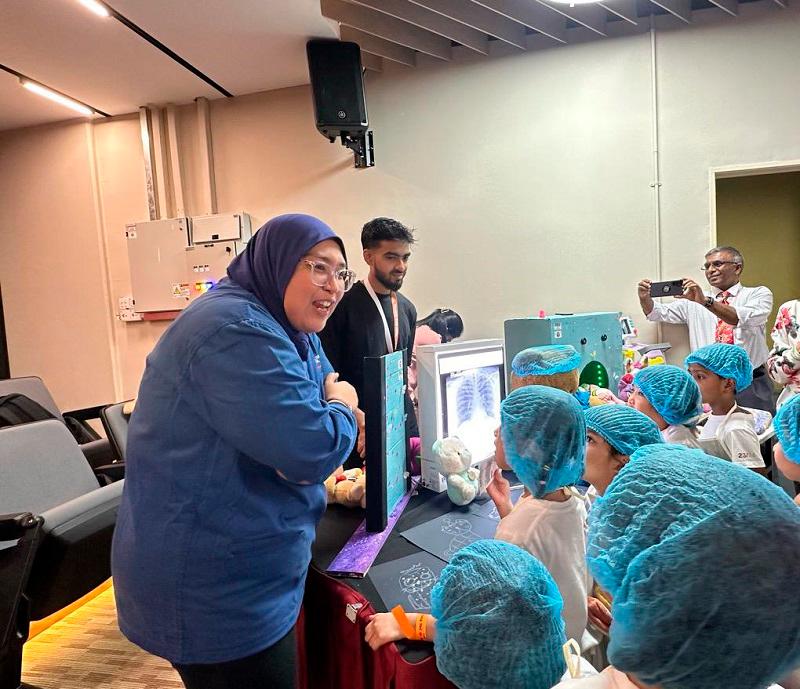HOSPITALS can be a daunting environment for children as they are filled with unfamiliar sights, sounds and procedures.
Research has found that over 90% of children aged four to six experience fears related to hospitals, with concerns primarily revolving around nursing interventions and being a patient.
Some of the primary fears highlighted were ward environment and medical staff as well as apprehension about treatments and procedures. This issue is prevalent among Malaysian children as well, with some showing significant resistance to leaving home at the mention of a hospital visit. Therefore, humanising healthcare through education, empathy and play is a transformative approach to making paediatric environments more child-friendly and inclusive.
Initiatives like the “Teddy Bear Hospital”, organised by Taylor’s University’s Digital Health and Medical Advancement Impact Lab, School of Medicine and School of Education aim to alleviate children’s anxieties surrounding healthcare by creating a safe and playful environment where children can interact with medical tools and learn about healthcare in a non-threatening way.
The event, which involved young participants aged five to six, teachers, student volunteers and staff members from various disciplines, saw children bringing their furry toys to a simulated medical setting.
In this interactive environment, medical students acted as doctors while the children played caregivers for their “sick” toys. Through this role-play, children were introduced to healthcare procedures in a fun and non-threatening manner.
Featuring a variety of engaging activities, the event emphasised how play is an innate part of childhood and can serve as a powerful tool for healing and learning.
Among the activities was an anatomy station where children explored basic anatomy and organ functions. They observed X-ray images to learn about diagnostic imaging, practised proper handwashing to understand the role of hygiene and participated in simulated surgery on teddy bears to experience the operating room.
Other highlights included learning about injuries and casts, understanding the importance of vaccinations through a mock immunisation session, exploring dental health through brushing and flossing demonstrations, and discovering healthy eating habits.
These activities helped foster understanding and reduce anxiety, allowing healthcare professionals to explain complex procedures in a simplified, engaging way that resonates with young minds. Cuddly toys serve as comforting emotional anchors, allowing children to feel secure as they navigate the experience. Many children described their toys as non-judgemental companions, offering support in ways that even adults could not.
Hospital play interventions have been widely acknowledged as effective tools for preparing children for medical procedures. They provide a space for young patients to confront and manage their anxieties.
Moreover, these programmes offer invaluable learning opportunities for medical and educational students by enhancing communication skills through age-appropriate interactions with children in a non-clinical setting. They foster empathy and bedside manners, encouraging sensitivity and compassion in patient care. Students also gain hands-on experience with basic procedures.
The success of the Teddy Bear Hospital underscores the power of collaboration between universities, medical and educational professionals and families. The initiative fosters trust and understanding in paediatric healthcare. Such programmes are reshaping paediatric healthcare by advocating for child-friendly environments and prioritising the emotional well-being of young patients to build a generation that views hospitals not with fear but with trust and confidence.
By breaking down psychological barriers and fostering empathy, humanising healthcare becomes more than just a trend; it becomes a necessary shift towards creating environments where children feel safe, supported and understood.
Prof Chong Pei Pei is the director of the Digital Health and Medical Advancement Impact Lab while Assoc Prof Dr Khine Pwint Phyu leads as a hub leader at Taylor’s University. Dr Lim Yin Sear is a senior lecturer at the School of Medicine, Faculty of Health and Medical Sciences and Revati Ramakrishnan is a senior lecturer at the School of Education at Taylor’s University. Comments: letters@thesundaily.com









